中考英语总复习资料 很好
- 格式:doc
- 大小:1.18 MB
- 文档页数:148
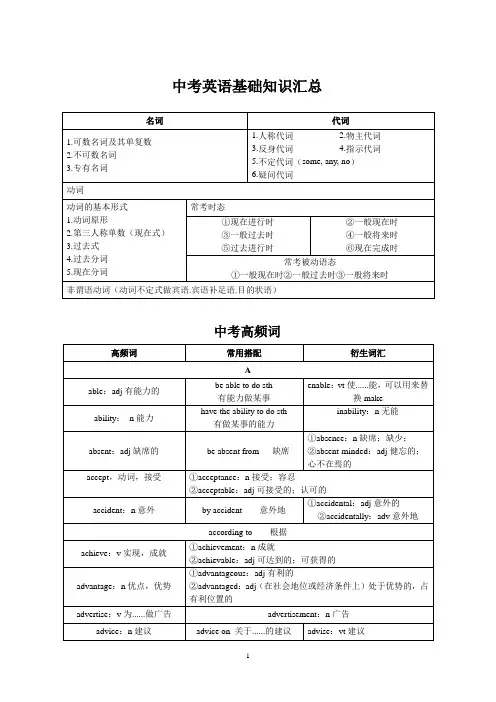
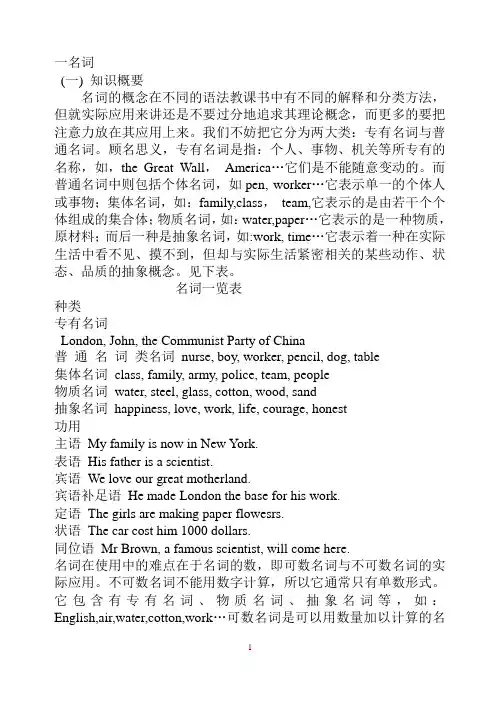
一名词(一) 知识概要名词的概念在不同的语法教课书中有不同的解释和分类方法,但就实际应用来讲还是不要过分地追求其理论概念,而更多的要把注意力放在其应用上来。
我们不妨把它分为两大类:专有名词与普通名词。
顾名思义,专有名词是指:个人、事物、机关等所专有的名称,如,the Great Wall,America…它们是不能随意变动的。
而普通名词中则包括个体名词,如pen, worker…它表示单一的个体人或事物;集体名词,如:family,class,team,它表示的是由若干个个体组成的集合体;物质名词,如:water,paper…它表示的是一种物质,原材料;而后一种是抽象名词,如:work, time…它表示着一种在实际生活中看不见、摸不到,但却与实际生活紧密相关的某些动作、状态、品质的抽象概念。
见下表。
名词一览表种类专有名词London, John, the Communist Party of China普通名词类名词nurse, boy, worker, pencil, dog, table集体名词class, family, army, police, team, people物质名词water, steel, glass, cotton, wood, sand抽象名词happiness, love, work, life, courage, honest功用主语My family is now in New York.表语His father is a scientist.宾语We love our great motherland.宾语补足语He made London the base for his work.定语The girls are making paper flowesrs.状语The car cost him 1000 dollars.同位语Mr Brown, a famous scientist, will come here.名词在使用中的难点在于名词的数,即可数名词与不可数名词的实际应用。
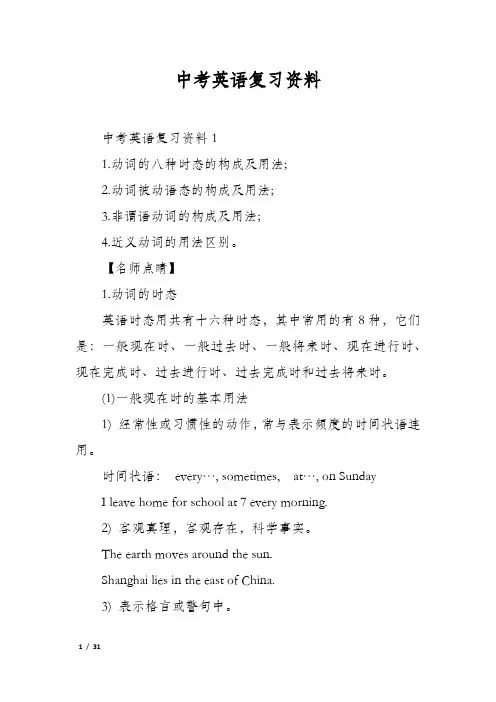
中考英语复习资料中考英语复习资料11.动词的八种时态的构成及用法;2.动词被动语态的构成及用法;3.非谓语动词的构成及用法;4.近义动词的用法区别。
【名师点睛】1.动词的时态英语时态用共有十六种时态,其中常用的有8种,它们是:一般现在时、一般过去时、一般将来时、现在进行时、现在完成时、过去进行时、过去完成时和过去将来时。
(1)一般现在时的基本用法1) 经常性或习惯性的动作,常与表示频度的时间状语连用。
时间状语:every…, sometimes,at…, on SundayI leave home for school at 7 every morning.2) 客观真理,客观存在,科学事实。
The earth moves around the sun.Shanghai lies in the east of China.3) 表示格言或警句中。
Pride goes before a fall.【注意】此用法如果出现在宾语从句中,即使主句是过去时,从句谓语也要用一般现在时。
例:Columbus proved that the earth is round..4) 现在时刻的状态、能力、性格、个性。
I dont want so much.5) 某些动词如come, go, move, stop, leave, arrive, be, finish, continue, start 等,在一般现在时句中可用来表示将来肯定会发生的动作。
The train comes at 3 oclock.6) 在时间状语从句或条件状语从句中,一般现在时代替一般将来时。
Ill help you as soon as you have problem.Tell Xiao Li about it if you meet him.(2)一般过去时的用法:表示过去某一时刻或某一段时间内所发生的动作或情况,通常一般过去式带有表示动作时间状语的词,词组或从句,如yesterday, the day before last, last week, two days ago 等,上下文清楚时可以不带时间状语。
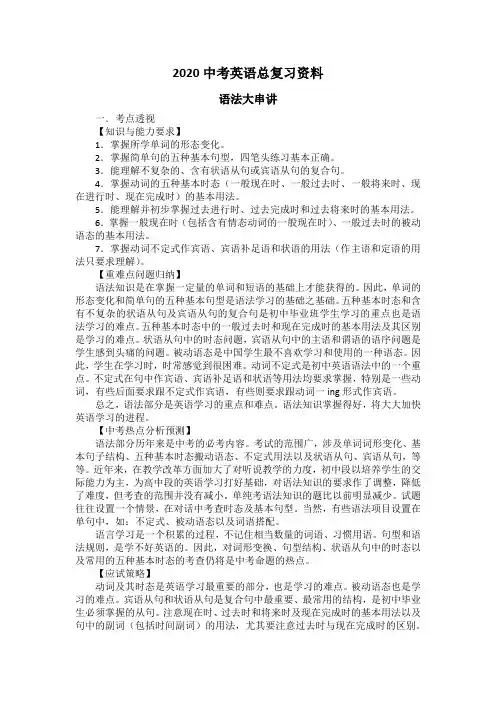
2020中考英语总复习资料语法大串讲一.考点透视【知识与能力要求】1.掌握所学单词的形态变化。
2.掌握简单句的五种基本句型,四笔头练习基本正确。
3.能理解不复杂的、含有状语从句或宾语从句的复合句。
4.掌握动词的五种基本时态(一般现在时、一般过去时、一般将来时、现在进行时、现在完成时)的基本用法。
5.能理解并初步掌握过去进行时、过去完成时和过去将来时的基本用法。
6.掌握一般现在时(包括含有情态动词的一般现在时)、一般过去时的被动语态的基本用法。
7.掌握动词不定式作宾语、宾语补足语和状语的用法(作主语和定语的用法只要求理解)。
【重难点问题归纳】语法知识是在掌握一定量的单词和短语的基础上才能获得的。
因此,单词的形态变化和简单句的五种基本句型是语法学习的基础之基础。
五种基本时态和含有不复杂的状语从句及宾语从句的复合句是初中毕业班学生学习的重点也是语法学习的难点。
五种基本时态中的一般过去时和现在完成时的基本用法及其区别是学习的难点。
状语从句中的时态问题,宾语从句中的主语和谓语的语序问题是学生感到头痛的问题。
被动语态是中国学生最不喜欢学习和使用的一种语态。
因此,学生在学习时,时常感觉到很困难。
动词不定式是初中英语语法中的一个重点。
不定式在句中作宾语、宾语补足语和状语等用法均要求掌握,特别是一些动词,有些后面要求跟不定式作宾语,有些则要求跟动词一ing形式作宾语。
总之,语法部分是英语学习的重点和难点。
语法知识掌握得好,将大大加快英语学习的进程。
【中考热点分析预测】语法部分历年来是中考的必考内容。
考试的范围广,涉及单词词形变化、基本句子结构、五种基本时态搬动语态、不定式用法以及状语从句、宾语从句,等等。
近年来,在教学改革方面加大了对听说教学的力度,初中段以培养学生的交际能力为主,为高中段的英语学习打好基础,对语法知识的要求作了调整,降低了难度,但考查的范围并没有减小。
单纯考语法知识的题比以前明显减少。
试题往往设置一个情景,在对话中考查时态及基本句型。
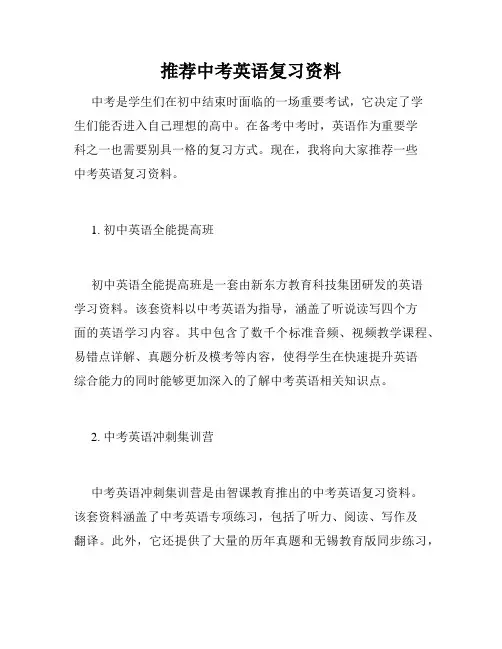
推荐中考英语复习资料中考是学生们在初中结束时面临的一场重要考试,它决定了学生们能否进入自己理想的高中。
在备考中考时,英语作为重要学科之一也需要别具一格的复习方式。
现在,我将向大家推荐一些中考英语复习资料。
1. 初中英语全能提高班初中英语全能提高班是一套由新东方教育科技集团研发的英语学习资料。
该套资料以中考英语为指导,涵盖了听说读写四个方面的英语学习内容。
其中包含了数千个标准音频、视频教学课程、易错点详解、真题分析及模考等内容,使得学生在快速提升英语综合能力的同时能够更加深入的了解中考英语相关知识点。
2. 中考英语冲刺集训营中考英语冲刺集训营是由智课教育推出的中考英语复习资料。
该套资料涵盖了中考英语专项练习,包括了听力、阅读、写作及翻译。
此外,它还提供了大量的历年真题和无锡教育版同步练习,覆盖了中考英语所有知识点,使得学生能够在短时间内快速提升中考英语水平。
3. 中考英语名校直通车中考英语名校直通车是由极客学院推出的中考英语复习资料。
该套资料采用线上直播授课、互动答疑、作业批改及阶段性测评等各种学习方式,以期使学生突破中考英语的瓶颈。
除此之外,它还提供了超过200套中考英语真题及历年全国卷,让学生在考前能够快速定位自身所处的备考情况,并作出针对性的复习。
4. 新华书店中考英语资料大全新华书店中考英语资料大全是指在新华书店购买的中考英语相关学习资料。
由于新华书店是国内知名的书店,因此它所销售的学习资料得到了各种品牌方的认可,学习资料的质量也趋于稳定和保证,此外,新华书店所销售的中考英语资料类型多样,适合不同学生的学习需求。
中考英语是一门要求不仅考生具备英语基础,还要求在有限时间内将基础一一转化为优异成绩。
只有通过科学、规律的复习方法,才能够事半功倍,取得较好的成绩。
以上四种复习资料涵盖了中考英语的各个方面,希望能够帮助到广大学生,实现其中考英语理想成绩的获得。
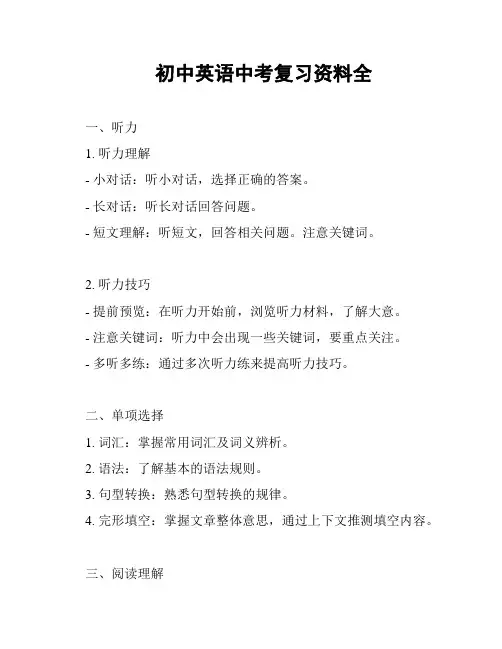
初中英语中考复习资料全
一、听力
1. 听力理解
- 小对话:听小对话,选择正确的答案。
- 长对话:听长对话回答问题。
- 短文理解:听短文,回答相关问题。
注意关键词。
2. 听力技巧
- 提前预览:在听力开始前,浏览听力材料,了解大意。
- 注意关键词:听力中会出现一些关键词,要重点关注。
- 多听多练:通过多次听力练来提高听力技巧。
二、单项选择
1. 词汇:掌握常用词汇及词义辨析。
2. 语法:了解基本的语法规则。
3. 句型转换:熟悉句型转换的规律。
4. 完形填空:掌握文章整体意思,通过上下文推测填空内容。
三、阅读理解
1. 标题理解:快速浏览文章,找出文章的主旨。
2. 细节理解:仔细阅读文章,找出特定细节。
3. 推理判断:根据文章内容进行推理判断。
4. 表达态度:理解文章作者的观点和态度。
四、写作
1. 书面表达:掌握合适的表达方式和句子结构。
2. 话题写作:对于给定的话题,能够展开合理的写作内容。
五、口语交际
1. 日常交际:熟练掌握日常用语表达。
2. 问答对话:能流利且准确地进行问答对话。
六、应试技巧
1. 时间安排:合理规划考试时间,合理分配各个部分所需时间。
2. 注意细节:注意题目的要求和限制条件。
3. 充分准备:提前复并进行模拟练。
以上是初中英语中考复的一些重点内容和技巧,希望对你的复
有所帮助。
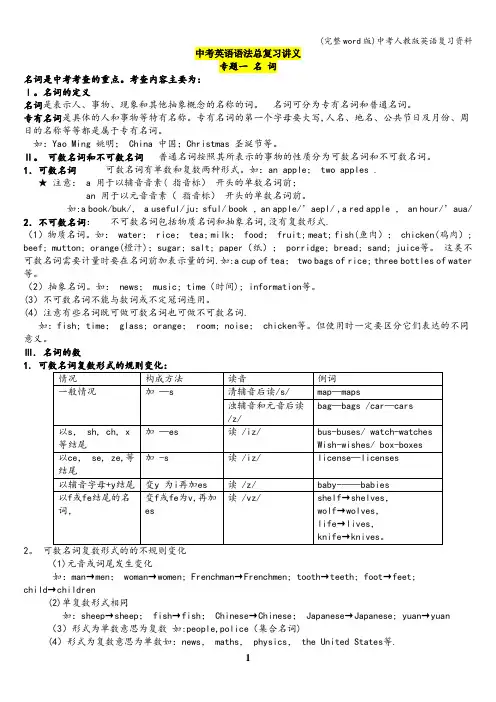
中考英语语法总复习讲义专题一名词名词是中考考查的重点。
考查内容主要为:Ⅰ。
名词的定义名词是表示人、事物、现象和其他抽象概念的名称的词。
名词可分为专有名词和普通名词。
专有名词是具体的人和事物等特有名称。
专有名词的第一个字母要大写,人名、地名、公共节日及月份、周日的名称等等都是属于专有名词。
如:Yao Ming 姚明; China 中国;Christmas 圣诞节等。
Ⅱ。
可数名词和不可数名词普通名词按照其所表示的事物的性质分为可数名词和不可数名词。
1.可数名词可数名词有单数和复数两种形式。
如:an apple; two apples .★ 注意: a 用于以辅音音素( 指音标)开头的单数名词前;an 用于以元音音素(指音标)开头的单数名词前。
如:a book/buk/, a useful/ju:sful/ book ,an apple/’aepl/ ,a red apple ,an hour/’aua/ 2.不可数名词:不可数名词包括物质名词和抽象名词,没有复数形式.(1)物质名词。
如: water; rice; tea; milk; food; fruit; meat; fish(鱼肉); chicken(鸡肉); beef; mutton; orange(橙汁);sugar; salt; paper(纸); porridge; bread; sand; juice等。
这类不可数名词需要计量时要在名词前加表示量的词.如:a cup of tea; two bags of rice; three bottles of water 等。
(2)抽象名词。
如: news; music; time(时间); information等。
(3)不可数名词不能与数词或不定冠词连用。
(4)注意有些名词既可做可数名词也可做不可数名词.如:fish; time; glass; orange; room; noise; chicken等。
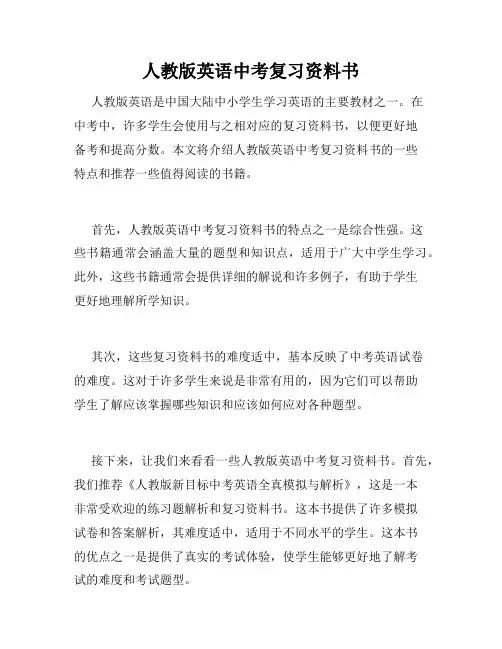
人教版英语中考复习资料书人教版英语是中国大陆中小学生学习英语的主要教材之一。
在中考中,许多学生会使用与之相对应的复习资料书,以便更好地备考和提高分数。
本文将介绍人教版英语中考复习资料书的一些特点和推荐一些值得阅读的书籍。
首先,人教版英语中考复习资料书的特点之一是综合性强。
这些书籍通常会涵盖大量的题型和知识点,适用于广大中学生学习。
此外,这些书籍通常会提供详细的解说和许多例子,有助于学生更好地理解所学知识。
其次,这些复习资料书的难度适中,基本反映了中考英语试卷的难度。
这对于许多学生来说是非常有用的,因为它们可以帮助学生了解应该掌握哪些知识和应该如何应对各种题型。
接下来,让我们来看看一些人教版英语中考复习资料书。
首先,我们推荐《人教版新目标中考英语全真模拟与解析》,这是一本非常受欢迎的练习题解析和复习资料书。
这本书提供了许多模拟试卷和答案解析,其难度适中,适用于不同水平的学生。
这本书的优点之一是提供了真实的考试体验,使学生能够更好地了解考试的难度和考试题型。
其次,我们推荐《人教版英语中考必备知识点详解》,这本书汇集了许多英语知识点,从词汇到语法,从听力到阅读到写作,这本书的内容非常全面,适用于需要针对性学习的学生。
此外,这本书提供了许多实用的学习方法和技巧,这对于许多学生来说非常有用。
最后,我们推荐《人教版英语中考精品题库》,这本书提供了大量的题目和答案解析,覆盖了中考英语试卷的各个方面。
这本书的重点是考查学生的解题能力和课堂所学知识的掌握程度。
这本书还提供了许多模拟试卷,可以帮助学生模拟真实的考试。
总之,人教版英语中考复习资料书是许多学生备考的重要资源。
这些书籍不仅提供了丰富的题目和学习资料,而且还提供了实用的方法和技巧,能够帮助学生更好地备考和提高成绩。
对于需要提高英语成绩的同学,推荐阅读以上推荐的书籍,希望这些书籍能对同学们的备考有所帮助。
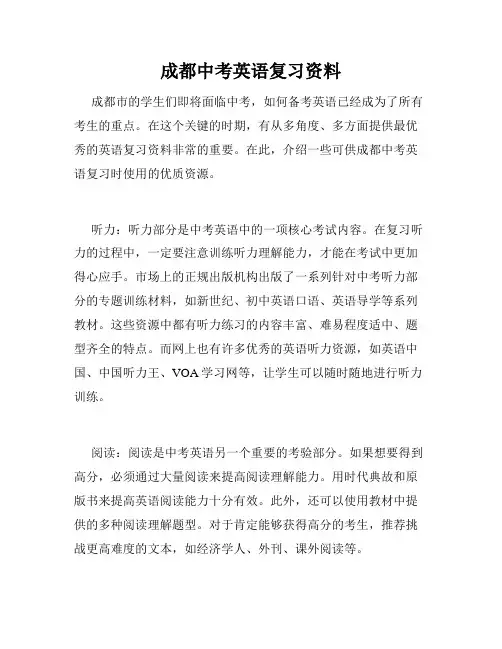
成都中考英语复习资料成都市的学生们即将面临中考,如何备考英语已经成为了所有考生的重点。
在这个关键的时期,有从多角度、多方面提供最优秀的英语复习资料非常的重要。
在此,介绍一些可供成都中考英语复习时使用的优质资源。
听力:听力部分是中考英语中的一项核心考试内容。
在复习听力的过程中,一定要注意训练听力理解能力,才能在考试中更加得心应手。
市场上的正规出版机构出版了一系列针对中考听力部分的专题训练材料,如新世纪、初中英语口语、英语导学等系列教材。
这些资源中都有听力练习的内容丰富、难易程度适中、题型齐全的特点。
而网上也有许多优秀的英语听力资源,如英语中国、中国听力王、VOA学习网等,让学生可以随时随地进行听力训练。
阅读:阅读是中考英语另一个重要的考验部分。
如果想要得到高分,必须通过大量阅读来提高阅读理解能力。
用时代典故和原版书来提高英语阅读能力十分有效。
此外,还可以使用教材中提供的多种阅读理解题型。
对于肯定能够获得高分的考生,推荐挑战更高难度的文本,如经济学人、外刊、课外阅读等。
书面表达:中考英语书面表达部分主要考察的是学生的写作能力。
有效提高写作能力有三点:第一、读各类优秀的英语原文及课外阅读书籍,积累一定的英语词汇和知识储备,并可以模仿这些文本进行练习;第二、掌握好写作的结构,即:开头+主体+结尾,积累一些常用的写作模板,比如,小学生热爱共享单车的原因、电子书和纸质书哪一个更值得青少年阅读等;第三、培养写作习惯,随时随地记录写作素材,将书写作为一个长期的、内在的过程,来提高写作的能力。
在复习书面表达过程中,还可以通过大量的写作模拟题和写作练习题来提高写作水平。
语法:语法是英语学习的基础,因此在中考英语复习的时候,一定不能忽略语法部分的学习。
要想提高语法能力,就要用语言环境去理解语法知识。
课本和教师都是学生学习语法的重要资源。
另外,市场上也出现了语法讲座专题,例如“语法必知必会”和“语法烽火”这样的优秀规划教材。
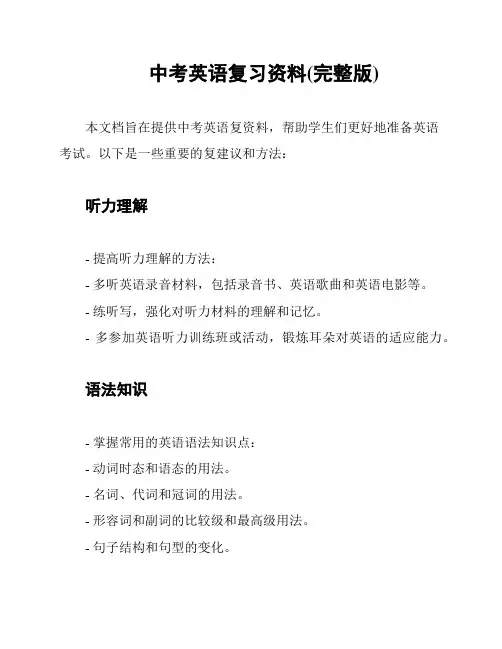
中考英语复习资料(完整版)
本文档旨在提供中考英语复资料,帮助学生们更好地准备英语
考试。
以下是一些重要的复建议和方法:
听力理解
- 提高听力理解的方法:
- 多听英语录音材料,包括录音书、英语歌曲和英语电影等。
- 练听写,强化对听力材料的理解和记忆。
- 多参加英语听力训练班或活动,锻炼耳朵对英语的适应能力。
语法知识
- 掌握常用的英语语法知识点:
- 动词时态和语态的用法。
- 名词、代词和冠词的用法。
- 形容词和副词的比较级和最高级用法。
- 句子结构和句型的变化。
阅读理解
- 针对阅读理解题的训练方法:
- 阅读英文报纸、杂志和故事书,提高阅读理解能力。
- 注意词汇的积累和理解,包括同义词、反义词和相关词汇等。
- 研究根据上下文推断词义和理解文章的主旨。
写作技巧
- 训练写作技巧的建议:
- 练写英语作文,包括日记、信件、文章等。
- 关注写作的结构和逻辑,注意段落的组织和过渡。
- 多读范文和优秀作文,研究他人的写作技巧和表达方式。
以上是一些中考英语复习的基本建议和方法,希望能对同学们
的备考有所帮助。
祝大家取得好成绩!。
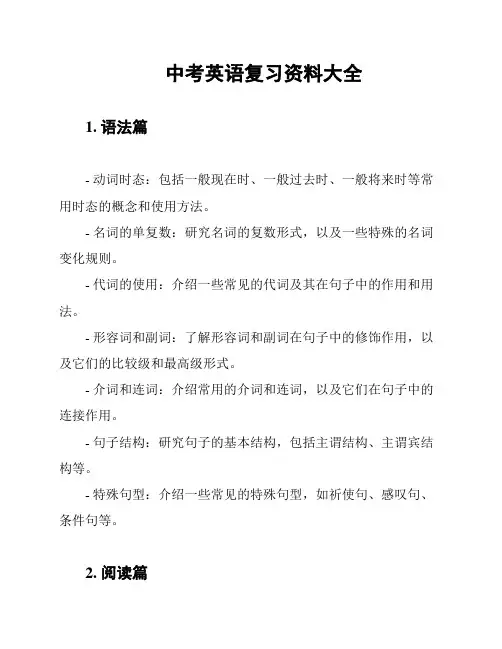
中考英语复习资料大全1. 语法篇- 动词时态:包括一般现在时、一般过去时、一般将来时等常用时态的概念和使用方法。
- 名词的单复数:研究名词的复数形式,以及一些特殊的名词变化规则。
- 代词的使用:介绍一些常见的代词及其在句子中的作用和用法。
- 形容词和副词:了解形容词和副词在句子中的修饰作用,以及它们的比较级和最高级形式。
- 介词和连词:介绍常用的介词和连词,以及它们在句子中的连接作用。
- 句子结构:研究句子的基本结构,包括主谓结构、主谓宾结构等。
- 特殊句型:介绍一些常见的特殊句型,如祈使句、感叹句、条件句等。
2. 阅读篇- 短文理解:练阅读并理解一些简短的英语文章,提高阅读速度和理解能力。
- 阅读技巧:研究一些阅读技巧,如快速扫读、略读、推测词义等,提高阅读效率。
- 阅读训练:进行大量的阅读训练,积累词汇量,提高阅读水平。
- 阅读理解题:做一些阅读理解题,锻炼对文章内容的综合理解和筛选能力。
3. 写作篇- 书面表达:研究书面表达的常用句型和写作技巧,练写作短文和作文。
- 话题写作:练根据不同话题进行写作,提高表达能力。
- 写作训练:进行写作训练,积累词汇和句型,提高写作水平。
- 作文评析:分析优秀作文和典型错误,研究写作技巧和改错能力。
4. 听力篇- 听力技巧:研究一些听力技巧,如预测选项、听懂关键信息等,提高听力效果。
- 听力训练:进行大量的听力训练,提高听力理解和反应能力。
- 听力材料:找一些中考听力材料进行听写和模拟考试,熟悉考试形式和题型。
以上是中考英语复习资料的大致范围,希望对你的备考有所帮助。
祝你取得优异的成绩!。
初中英语复习资料Section 1: 词汇复
- 重点词汇复:
- 单词音标、词义及用法
- 词语辨析
- 语境运用:
- 阅读理解题型,根据上下文猜测词义
- 词汇填空题型,根据句意选择合适的词汇Section 2: 语法复
- 时态复:
- 现在时、过去时、将来时等时态的用法
- 时态在句子中的转换
- 语法知识点:
- 名词、动词、形容词、副词等的基本用法
- 语法规则运用,如主谓一致、代词的使用等Section 3: 句型复
- 基本句型:
- 肯定句、否定句、疑问句等基本句型的构成- 不同句型在交流中的运用
- 复合句构造:
- 并列句、从句等复合句的构造和用法
- 复合句在段落表达中的运用
Section 4: 阅读理解
- 阅读理解题型:
- 根据文章理解文章主旨、细节等
- 根据文章回答相关问题
- 阅读技巧:
- 阅读过程中的标记和总结
- 提升阅读速度和理解能力的方法
Section 5: 写作练
- 写作类型:
- 书面表达、口头表达等不同形式的写作练
- 基础句式和词汇运用的训练
- 写作技巧:
- 写作前的构思和提纲准备
- 写作过程中的语言表达和段落结构的掌握
以上是初中英语复习资料的完整版,希望能够帮助你做好复习准备。
加油!。
目录中考英语复习资料:名词考点集汇、讲解和训练 (2)中考英语复习资料:形容词、副词考点集汇、讲解和训练 (11)中考英语复习资料:动词考点集汇、讲解和训练 (23)中考英语复习资料:数词、冠词考点集汇、讲解和训练 (41)中考英语复习资料:代词考点集汇、讲解和训练 (53)中考英语复习资料:介词、连词考点集汇、讲解和训练 (70)中考英语复习资料:英语句子考点集汇、讲解和训练 (83)中考英语复习资料:宾语从句考点集汇、讲解和训练 (98)中考英语复习资料:状语从句考点集汇、讲解和训练 (107)中考英语复习资料:定语从句考点集汇、讲解和训练 (118)中考英语复习资料:主谓一致考点集汇、讲解和训练 (127)中考英语复习资料:短语动词和句型考点集汇、讲解和训练 (136)中考英语复习资料:交际用语考点集汇、讲解和训练 (155)中考英语复习资料:单项填空考点集汇、讲解和训练 (175)中考英语复习资料:完形填空考点集汇、讲解和训练 (191)中考英语复习资料:阅读理解考点集汇、讲解和训练 (210)中考英语复习资料:听力理解考点集汇、讲解和训练 (241)中考英语复习资料:补全对话考点集汇、讲解和训练 (252)中考英语复习资料:书面表达的考点集汇、讲解和训练 (262)11中考英语复习资料:名词考点集汇、讲解和训练【考点直击】1.可数名词和不可数名词的用法;2.名词所有格的构成及用法;3.近义名词的辨析。
22【名师点睛】一、名词的数1.单数和复数可数名词有单数和复数两种形式。
复数形式通常是在单数形式后加词尾“-s”构成,其主要变法如下:(1)一般情况在词尾加-s,例如:book→books,girl→girls,boy→boys,pen→pens,doctor→doctors, boy→boys。
(2)以s,x,ch,sh,结尾的词加-es,例如:bus→buses,class→classes,box→boxes,watch→watches,brush→brushes。
中考英语总复习资料总汇(完整版)一、名词的数1.单数和复数可数名词有单数和复数两种形式。
复数形式通常是在单数形式后加词尾“-s”构成,其主要变法如下:(1)一般情况在词尾加-s,例如:book→books,girl→girls,boy →boys,pen→pens,doctor→doctors, boy→boys。
(2)以s,x,ch,sh,结尾的词加-es,例如:bus→buses,class →classes,box→boxes,watch→watches,brush→brushes。
(3)以ce, se, ze,(d)ge结尾的名词加s,例如:orange—oranges。
(4)以辅音母加y结尾的词变“y”为“i”再加-es,例如:city→cities, factory→factories, country→countries, family→families。
但要注意的是以元音字母加y结尾的名词的复数形式只加s,如:boy→boys, day→days。
(5)以o结尾的词多数都加-es。
例如:hero→heroes,potato→potatoes,tomato→tomatoes,但词末为两个元音字母的词只加-s。
例如:zoo→zoos,radio→radios,还有某些外来词也只加-s,例如:photo→photos,piano→pianos。
(6)以f或fe结尾的词,多数变f为v再加-es,例如:knife→knives,leaf→leaves, half→halves。
复数词尾s(或es)的读音方法如下表所示。
复数词尾s(或es)的读音方法(7)少数名词有不规则的复数形式,例如:man→men,woman→women,tooth→teeth,foot→feet,child→children,mouse→mice。
【注意】与man和woman构成的合成词,其复数形式也是-men和-women。
初三中考英语重点复习资料归纳初三中考英语重点复习资料1连词及其用法1.连词是一种虚词,它不能独立担当句子成分而只起连接词与词,短语与短语以及句与句的作用。
2.常见的连词and(和,与;而且;于是,然后;因此)but(但是;通常用not...but...不是...而是...;可是,然而;表示惊异,不同意等--喔,哇;用来加强语句重复部分的语气--一定;用来引入新话题--那就;常用于否定句--而不,若不;用于含doubt,question等字的否定句中相当于that--对于) or(或者,还是;用于否定句或问句--也不;否则,要不然;也就是说,换言之)nor(用在neither之后--也不;用在no,not,never之后--也不;用在句首,句子需倒装--也不)so(因此,所以;因而,从而)yet(可是,却,然而)for(因为,由于)both…and(既...又...;不但...而且)notonly…butalso(不但,而且)either…or(不是...就是;要么...要么)neither…nor(既不...也不...)3.并列连词:①and与or;②both…and两者都;③notonly…but...aswellas=notonly...butalso不但…而且;④neither…nor 意思为"既不……也不……"谓语动词采用就近原则,与nor后的词保持全都。
4.转折或对比连词①but表示转折,while表示对比。
②not…but…意思为"不是……而是……"。
宾语从句1.宾语从句,是名词性从句的一种。
在主从复合句中充当宾语,位于及物动词、介词或复合谓语之后的从句称为宾语从句。
宾语从句分为三类:动词的宾语从句,介词的宾语从句和形容词的宾语从句。
2.宾语从句的引导词有三种:(1)以that引导的宾语从句:that引导的宾语从句一般都是由陈述句充当,引导词that 没有实际意义,不在从句中作任何成分,that可以省略,而且从句成分齐全,句意完整。
中考英语复习资料大全随着中考的逐渐临近,各位同学们都开始为英语考试做准备。
英语作为一门语言类科目,需要同学们多加练习和积累才能获得好成绩。
本文将为同学们提供一份中考英语复习资料大全,帮助大家更好地备考。
1. 词汇英语词汇的积累是英语考试的重要部分。
同学们需要具备一定的词汇量,才能在阅读和写作中得到更好的表达。
对于中考英语来说,同学们可以阅读经典课文和题型,结合生活中常见的词汇来进行积累。
此外,同学们还可以使用一些词汇学习工具,如牛津词典、朗文词典等,来帮助自己的词汇积累。
2. 阅读理解阅读理解题是英语考试的重要部分,同学们需要在平时通过大量的阅读来提高阅读能力。
对于中考英语来说,同学们需要做好阅读理解的基本功,如抓住文章的关键词、理解文章中的逻辑关系和推断结论等。
同时,同学们可以通过做一些模拟题和真题来加强练习。
3. 语法语法是英语考试的难点之一,同学们需要在平时通过强化语法知识来提高语法水平。
对于中考英语来说,同学们需要掌握常见的语法知识点,如时态、语态、句子成分和语法结构等。
对于语法题型,同学们需要强化练习,如做题、改错和填空等。
4. 写作写作是英语考试的重点之一,同学们需要在平时通过大量的写作来提高自己的写作水平。
对于中考英语来说,同学们需要掌握写作的基本技巧,如文章结构、语言表达和段落转换等。
同时,同学们要在写作中注重词汇的使用和语法的准确性。
5. 口语口语是英语考试中的一项重要部分,同学们需要通过大量的口语练习来提高自己的口语表达能力。
对于中考英语来说,同学们需要掌握日常用语和交际技巧,如问候、介绍和感谢等。
同时,同学们还需要注意语音、语调和语速等问题。
以上就是中考英语复习资料大全的相关内容。
同学们需要在平时加强对英语的学习和练习,通过多种方式积累词汇、理解阅读、强化语法、提高写作和加强口语等方面,来迎接中考英语的挑战。
仁爱英语中考总复习资料(推荐完整)编辑整理:尊敬的读者朋友们:这里是精品文档编辑中心,本文档内容是由我和我的同事精心编辑整理后发布的,发布之前我们对文中内容进行仔细校对,但是难免会有疏漏的地方,但是任然希望(仁爱英语中考总复习资料(推荐完整))的内容能够给您的工作和学习带来便利。
同时也真诚的希望收到您的建议和反馈,这将是我们进步的源泉,前进的动力。
本文可编辑可修改,如果觉得对您有帮助请收藏以便随时查阅,最后祝您生活愉快业绩进步,以下为仁爱英语中考总复习资料(推荐完整)的全部内容。
仁爱英语中考总复习资料(推荐完整)编辑整理:张嬗雒老师尊敬的读者朋友们:这里是精品文档编辑中心,本文档内容是由我和我的同事精心编辑整理后发布到文库,发布之前我们对文中内容进行仔细校对,但是难免会有疏漏的地方,但是我们任然希望仁爱英语中考总复习资料(推荐完整)这篇文档能够给您的工作和学习带来便利.同时我们也真诚的希望收到您的建议和反馈到下面的留言区,这将是我们进步的源泉,前进的动力。
本文可编辑可修改,如果觉得对您有帮助请下载收藏以便随时查阅,最后祝您生活愉快业绩进步,以下为 <仁爱英语中考总复习资料(推荐完整)> 这篇文档的全部内容.初三英语总复习笔记七年级(上)Unit 1 复习要点短语和句子1、Good morning/ Good afternoon / evening .早上/下午/晚上好2、(It’s) Nice to meet/see you. = (It’s)Good to meet/see you.= (I’m) Glad to meet/see you= (I’m)Pleased to meet/see you= (I’m) Happy to meet/see you. 很高兴见到你3、Welcome to China 欢迎到中国来.4、Thanks /Thank you 。
谢谢5、You’re welcome 。
初一年级上学期(7A)Unit 1---3重点词组football field 足球场World Cup 世界杯lots of friends 许多朋友be born 出生after school 放学后wake up 醒醒work hard 努力工作wear glasses 戴眼镜love dancing 爱跳舞football player 足球运动员badminton court 羽毛球场swimming pool 游泳池English club 英语俱乐部at lunchtime 在午饭时间take the bus 乘公共汽车at the weekend 在周末look happy 看上去高兴have a good time 过得愉快do morning exercises 做早操make model planes 做模型飞机the sharp teeth 锋利的牙齿Dragon Boat Festival 端午节Mid-Autumn Festival 中秋节Chinese New Year 春节be good at swimming 擅长游泳twice a week 一周两次walk her dog 遛她的狗at the volleyball court 在排球场meet up with… 与……约好见面knock on the door 敲门cut out 割出(某个形状)have fun 有乐趣rice dumplings 粽子play a trick on them 捉弄他们red packets 红包take my dog for a walk 带狗去散步like listening to music 喜欢听音乐play for 为……踢球have lessons 上课have breakfast 吃早饭in winter 在冬天listen to the radio 听收音机on October 1st在10月1日at Christmas 在圣诞节dress up as a ghost 装扮成一个鬼lion dance 狮子舞go running for half an hour跑半个小时spend…(in)doing… 花(时间或金钱)干某事enjoy playing computer games 喜欢玩电脑游戏give us some candy as a treat 用一些糖果招待我们a member of the Swimming Club 游泳俱乐部的一位成员watch football matches on TV 观看电视里的足球赛know a lot about computers 知道许多有关电脑(的知识)on the evening of October 31st 在10月31日的晚上make lanterns out oranges 用橘子做出灯笼shine through the eyes 透过眼睛闪烁着on the other side of the flash card 在幻灯卡的另一面give them a treat of some candy 用一些糖果招待他们look forward to something / doing something 期盼某事/ 期盼做某事语法精讲1、一般现在时1)一般现在时的形式主语为第三人称单数时,需在动词原形后加s或es:A. 多数动词后面加s。
如eat—eats, play—plays, swim—swims, walk—walks。
B. 以字母o, s, x, ch, sh 结尾的动词后面加es。
如do—does, go—goes, guess—guess, fix—fixes, teach—teaches, push—pushes。
C. 末尾为-y的动词分两种情况:a. 若-y前为辅音字母时,则将-y变为-i,再加-es。
如study—studies, fly—flies, cry—cries。
(-y前分别为辅音字母d, l, r。
)b. 如-y 前为元音字母时,则-y 不变,直接在-y后面加-s。
元音字母共五个。
它们是a, e, I, o, u。
如say—says, buy—buys, enjoy—enjoys。
(-y前分别为元音字母a, u, o。
)2) 一般现在时所表达的含义A. 永恒的真理或事实。
The sun comes out from the east. 太阳从东方升起。
Light travels faster than sound. 光速比声速快。
Cats eat fish. 猫吃鱼。
表述“现在时段”。
“一般现在时可用以陈述现在时段内发生或存在的事件、动作或情况。
这些事件、动作或情景说不定会无限地延续下去。
但实际上,我们的意思则是在说“这是现在存在着的状况”。
My hair is very long. 我的头发很长。
Millie lives in Beijing. Millie住在北京。
His parents work in a supermarket. 他的父母亲在一家超市里工作。
B.有规律发生的动作一般现在时可用来表示习惯性动作,也就是指不断重复的事情。
这种用法通常可与表示时间的副词或词组伴随使用,如:often, always, usually, sometimes,seldom, everyday。
He gets to his company at half past eight every day. 他每天八点半到公司。
Simon always plays football after school. 西蒙放学后经常踢足球。
At the weekend, I usually go running for half an hour. 周末我通常跑步半小时。
Sometimes my mother flies a kite with me in the park.有时我妈妈和我在公园里放风筝。
2.人称代词和物主代词1)人称代词A. 人称代词分为主格和宾格两种形式。
如果是作句子主语成分的人称代词就必须使用主格形式;如果是作句子宾语成分的人称代词就必须使用宾格形式。
还有,在介词后面必须使用宾格形式。
如:She likes her dog. She often walks him. 她喜欢她的狗。
她经常带他遛遛。
(she是主格,him是宾格。
)Where are they? I can’t find them. 他们在哪里?我找不到他们。
(they、I是主格, them是宾格)Don’t worry about me! I can look after it well. 别为我担心。
我可以照看好它的。
(about和after是介词,me和it是宾格。
)B. 习惯顺序如果主语是几个并列的人称代词时,习惯顺序是:we, you and they;you, he / she and I。
You, he and I are classmates. 你、我、他是同班同学。
C. 中性代词it的用法It除了可指代动物、事物外,还可以指时间、天气、距离或温度。
如:I have a lovely cat. I like it very much. 我有一只可爱的猫。
我非常喜欢它。
(it指动物)English is very useful. It is my favourite subject. 英语很有用。
它是我最喜爱的学科。
(it 指事物)It is about five kilometers from here. 离这儿大约五公里。
(it指距离)It’s 9:00pm. I must go. 现在晚上九点了。
我必须走了。
(it指时间)How windy it is today! 今天风多大啊!(it指天气)另外,it也可用于以下情况之中:弄不清婴儿或小孩性别时:What a lovely baby it is! 多么可爱的宝宝啊!看不见对方时:--- There’s a knock on the door. Go and see who it is. --- It’s Jim.--- 有人敲门。
去看看是谁。
--- 是吉姆。
(ring!)--- Hello! Who is it? --- It’s Mary speaking. ---喂,谁呀?---是玛莉。
照片或图片中的人物:--- Who’s the little boy? --- It’s me. 那小男孩是谁?--- 是我。
2)物主代词物主代词可分为形容词性物主代词和名词性物主代词两种形式。
形容词性物主代词具有形容词的作用,只能作定语,后面必须要跟上一个名词;而名词性物主代词则具有名词的作用,可在句中作主语、表语或宾语。
换言之,名词性物主代词=形容词性物主代词+名词。
如:The red one is her car. Mine is the blue one. 红色的那辆是她的车。
我的是那辆兰色的。
(mine = my car, 且在句中作主语。
)I don’t want their answers. Tell me yours. 我不要他们的答案。
告诉我你的答案。
(yours = your answer, 且在句中作宾语。
)3. Some dogs just don’t know how to have fun.一些狗就是不懂怎么玩。
1)在此句中“how to have fun” 是know的宾语。
“疑问词+to do”形“所表达的含义相当于一个名词,因此,它可充当句子的主语成分或是宾语成分。
如:Where to look for the lost boy is still a big problem now. (作主语)去哪里找那个失踪的男孩仍是个大问题。
We are talking about which book to buy first. (作宾语) 我们在谈论先买哪本书。
2)“have fun”的“思是“嬉戏”、“娱乐”。
“un 是不可数名词,也可作定语,意为“有趣”、“逗笑”。
“:We had lots of fun at the party today! 我们今天在聚会上玩得很开心!It is a fun hat. 它是顶可笑的帽子。
4.My favourite lessons are Chinese and English.我最喜欢的课程是语文和英语。
Favourite 是形容词,意为“最喜欢的”。
“可以和“like……best”的形式替换。
如:What’s his favourite colour? His favourite colour is blue. 可转换为What colour does he like best? He likes blue best. 他最喜欢什么颜色?他最喜欢兰色。